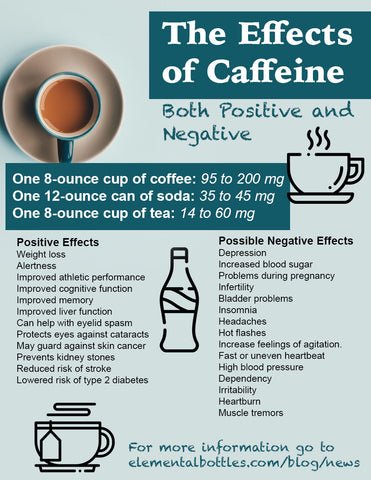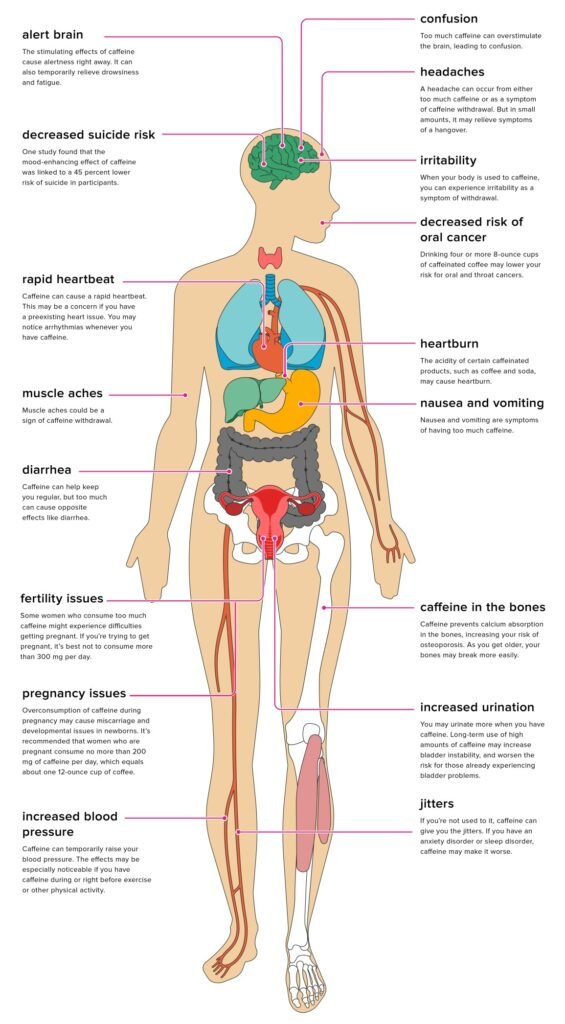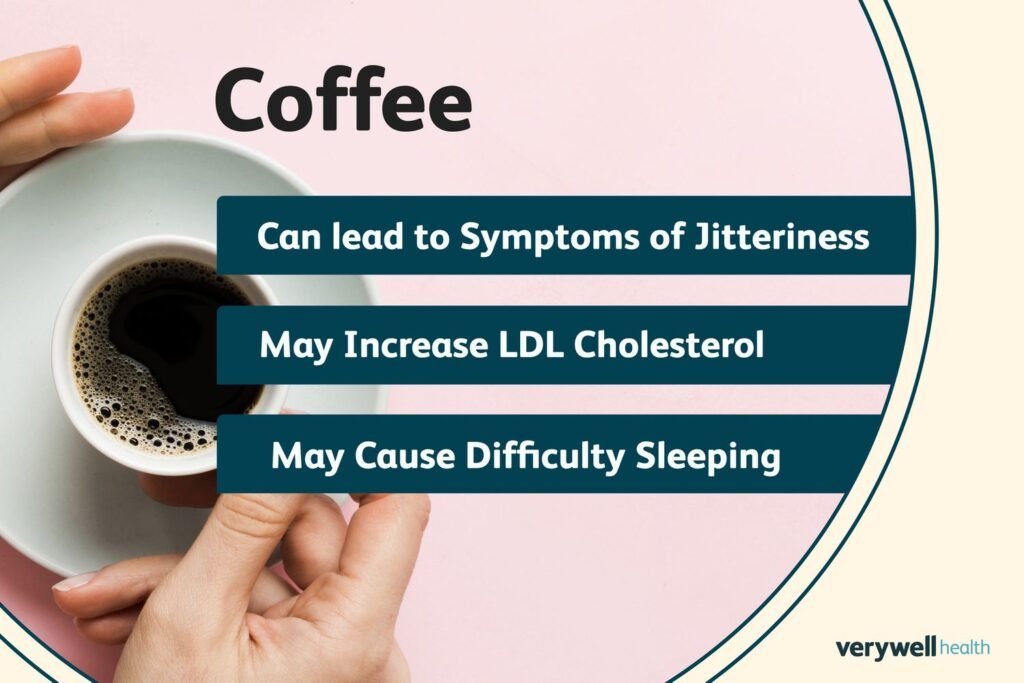Do you ever wonder what happens when you drink coffee every day? This beloved beverage is more than just a morning ritual; it’s a daily habit for many people worldwide. However, understanding its impact on your body and mind can make a tremendous difference in how you consume it. Below, we will dissect the side effects of drinking coffee every day, from the positive to the potentially negative ones.

The Positives of Drinking Coffee Daily
When consumed in moderation, coffee offers a myriad of benefits that can enrich your daily life. Let’s explore some of the positive aspects of your daily coffee habit.
Boosts Physical Performance
Coffee is a well-known performance enhancer. The caffeine within it can increase adrenaline levels in the bloodstream, helping you get ready for physical exertion. This can be particularly beneficial if you engage in regular exercise or need an early-morning boost.
Enhances Brain Function
One of the most compelling reasons for drinking coffee is its ability to improve cognitive functioning. Caffeine blocks an inhibitory neurotransmitter known as adenosine, thus increasing the levels of other neurotransmitters like norepinephrine and dopamine. This leads to enhanced firing of neurons and improved brain function. Tasks involving memory, mood, vigilance, energy levels, and general mental function can see improvements.
Provides Essential Nutrients
Many people don’t realize that coffee contains essential nutrients crucial for well-being. A single cup of coffee includes:
| Nutrient | Amount per Cup |
|---|---|
| Vitamin B2 (Riboflavin) | 11% of the RDA |
| Vitamin B5 (Pantothenic Acid) | 6% of the RDA |
| Vitamin B1 (Thiamine) | 2% of the RDA |
| Vitamin B3 (Niacin) | 2% of the RDA |
| Folate | 1% of the RDA |
| Manganese | 3% of the RDA |
| Potassium | 3% of the RDA |
While these percentages might seem small, they add up, particularly if you consume multiple cups throughout the day.
Fights Depression
Depression is a severe mental health issue that affects millions worldwide. Studies indicate that coffee may significantly reduce the risk of developing depression. One study showed that those who drank four or more cups of coffee per day were 20% less likely to become depressed.
Lowers Risk of Certain Diseases
Regular coffee consumption has been linked to lowering the risks of several diseases. These include, but are not limited to, Type 2 diabetes, Alzheimer’s, Parkinson’s disease, and certain types of cancer, particularly liver cancer. Given that these are some of the leading causes of death worldwide, drinking coffee could contribute positively to your overall health.
Potential Negative Side Effects of Daily Coffee Consumption
While coffee has numerous benefits, it’s essential to be aware of its potential negative side effects. Overconsumption or sensitivity to caffeine can lead to several issues.
Increased Anxiety Levels
Caffeine is known to increase alertness by blocking the effects of adenosine, a brain chemical that makes you feel tired. However, this heightened alertness can also translate into anxiety and restlessness, particularly in individuals prone to anxiety disorders. Even small amounts of coffee can lead to these effects in sensitive people.
Digestive Issues
Coffee is acidic, which can irritate the lining of your stomach and cause digestive issues like acid reflux, heartburn, or ulcers. Those who already struggle with gastrointestinal problems might find that their symptoms worsen with coffee consumption.
Dependence and Withdrawal
Caffeine is an addictive substance. Regular consumption can lead to tolerance, meaning you may need more caffeine to achieve the same effect over time. If you go without your daily coffee, you might experience withdrawal symptoms like:
- Headache
- Fatigue
- Irritability
- Difficulty concentrating
Disrupted Sleep Patterns
Coffee can interfere with your sleep due to its stimulating effects. The half-life of caffeine is about 5-6 hours, meaning it takes this amount of time for half of the caffeine to be eliminated from your body. Consuming coffee later in the day can disrupt your sleep, leading to insomnia or reduced quality of sleep. Poor sleep can, in turn, affect your overall health and well-being.
Bone Health Risks
Some studies have suggested that excessive coffee consumption could lead to decreased bone density, increasing the risk of fractures. This is particularly significant for older adults and those already at risk for osteoporosis.

Finding the Balance: How Much is Too Much?
Finding the right balance in coffee consumption is key to maximizing its benefits while minimizing the risks. Recommendations from health experts vary, but here are some general guidelines to keep in mind.
Recommended Daily Intake
The general consensus is that up to 400 milligrams of caffeine per day is safe for most adults. This is roughly equivalent to four 8-ounce cups of brewed coffee. However, individual tolerance levels can vary greatly.
Factors That Affect Tolerance
Several factors can influence how your body responds to coffee, including:
- Genetics: Some people metabolize caffeine faster than others.
- Age: Older adults may be more sensitive to caffeine’s effects.
- Medications: Certain medications can interact with caffeine.
- Health Conditions: Pre-existing health issues can affect how you tolerate coffee.
Tips for Moderate Consumption
| Tip | Description |
|---|---|
| Gradually Reduce Intake | If you consume large amounts of coffee, consider gradually reducing your intake to avoid withdrawal symptoms. |
| Opt for Decaf | If you love the taste but want to cut down on caffeine, decaf coffee is a good alternative. |
| Stay Hydrated | Coffee is a diuretic, so ensure you drink enough water throughout the day to stay hydrated. |
| Balance Your Diet | Make sure your diet includes various foods that provide all the nutrients you need to offset any deficiencies that coffee might exacerbate. |

Alternatives to Drinking Coffee Daily
If you find that the side effects of daily coffee drinking outweigh the benefits, there are numerous alternatives to consider.
Herbal Teas
Herbal teas, such as chamomile, peppermint, and ginger tea, offer various health benefits without the caffeine. They can provide a warm, comforting beverage experience, similar to coffee, minus the jittery side effects.
Green Tea
Green tea contains less caffeine than coffee but can still offer a mild energy boost. It’s also packed with antioxidants and other health benefits, making it a healthy alternative.
Chicory Root Coffee
Chicory root coffee is another excellent coffee substitute. It has a similar taste to coffee but is caffeine-free and offers its own health benefits, such as improved digestion and reduced inflammation.
Golden Milk
Golden milk, made from turmeric and milk (or a non-dairy alternative), is a flavorful, caffeine-free beverage. It’s packed with anti-inflammatory properties and other health benefits.

Conclusion: The Intelligent Coffee Drinker
By being mindful of how much coffee you consume and paying attention to how it affects your body, you can enjoy this popular beverage without compromising your health. Coffee has numerous benefits, but it’s essential to be aware of its potential side effects and adjust your intake accordingly.
Assess your individual tolerance levels, consider moderating your intake, and explore alternatives if necessary. By doing so, you can continue to enjoy your favorite cup of joe while maintaining overall wellness.
Isn’t it fascinating how something as simple as a cup of coffee can have such profound effects on your body and mind?

